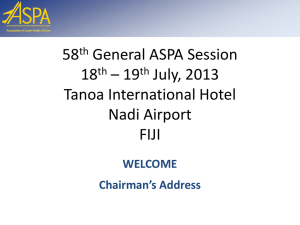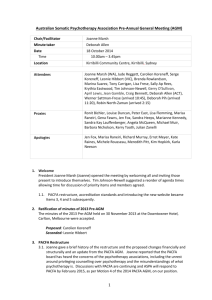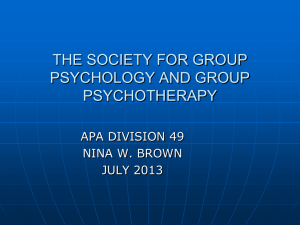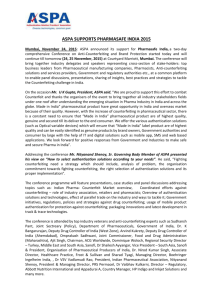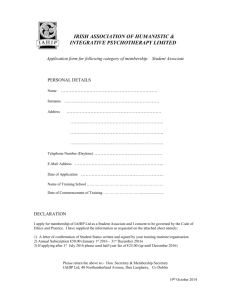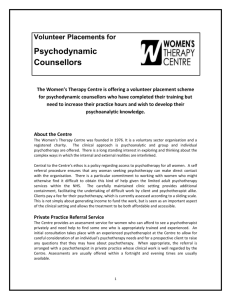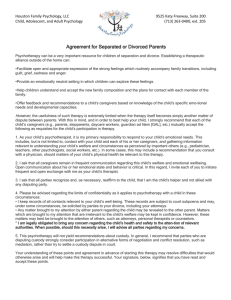PACFA Restructure in Detail - Australian Somatic Psychotherapy
advertisement
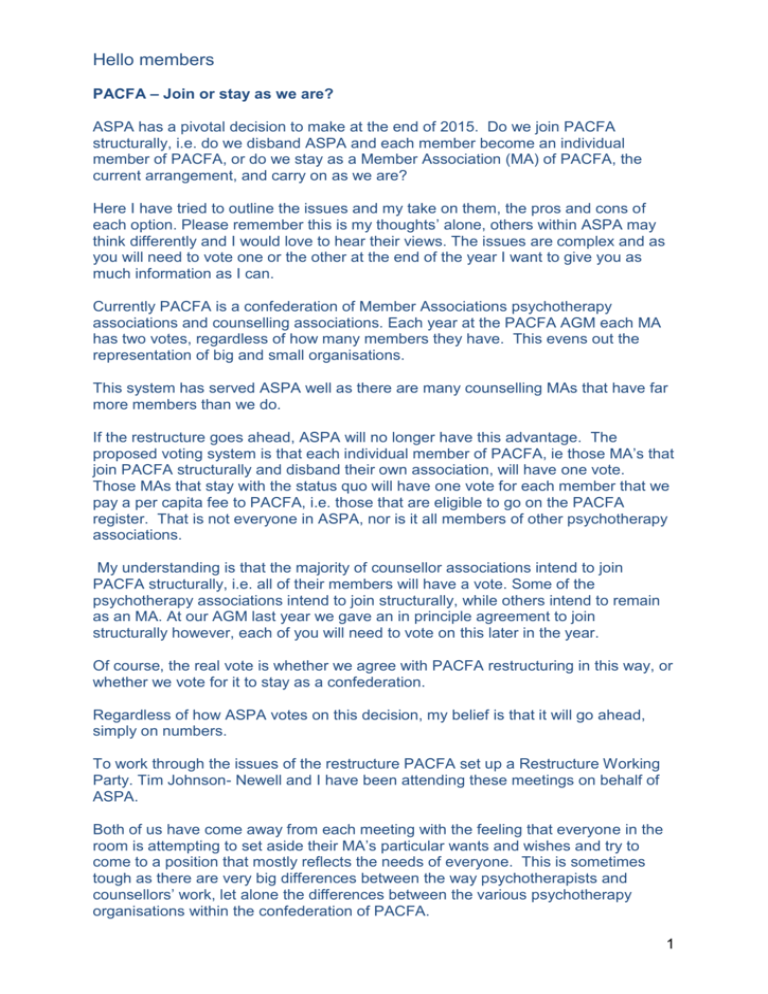
Hello members PACFA – Join or stay as we are? ASPA has a pivotal decision to make at the end of 2015. Do we join PACFA structurally, i.e. do we disband ASPA and each member become an individual member of PACFA, or do we stay as a Member Association (MA) of PACFA, the current arrangement, and carry on as we are? Here I have tried to outline the issues and my take on them, the pros and cons of each option. Please remember this is my thoughts’ alone, others within ASPA may think differently and I would love to hear their views. The issues are complex and as you will need to vote one or the other at the end of the year I want to give you as much information as I can. Currently PACFA is a confederation of Member Associations psychotherapy associations and counselling associations. Each year at the PACFA AGM each MA has two votes, regardless of how many members they have. This evens out the representation of big and small organisations. This system has served ASPA well as there are many counselling MAs that have far more members than we do. If the restructure goes ahead, ASPA will no longer have this advantage. The proposed voting system is that each individual member of PACFA, ie those MA’s that join PACFA structurally and disband their own association, will have one vote. Those MAs that stay with the status quo will have one vote for each member that we pay a per capita fee to PACFA, i.e. those that are eligible to go on the PACFA register. That is not everyone in ASPA, nor is it all members of other psychotherapy associations. My understanding is that the majority of counsellor associations intend to join PACFA structurally, i.e. all of their members will have a vote. Some of the psychotherapy associations intend to join structurally, while others intend to remain as an MA. At our AGM last year we gave an in principle agreement to join structurally however, each of you will need to vote on this later in the year. Of course, the real vote is whether we agree with PACFA restructuring in this way, or whether we vote for it to stay as a confederation. Regardless of how ASPA votes on this decision, my belief is that it will go ahead, simply on numbers. To work through the issues of the restructure PACFA set up a Restructure Working Party. Tim Johnson- Newell and I have been attending these meetings on behalf of ASPA. Both of us have come away from each meeting with the feeling that everyone in the room is attempting to set aside their MA’s particular wants and wishes and try to come to a position that mostly reflects the needs of everyone. This is sometimes tough as there are very big differences between the way psychotherapists and counsellors’ work, let alone the differences between the various psychotherapy organisations within the confederation of PACFA. 1 1. Future vision PACFA is a stronger and better resourced peak body for the psychotherapy and counselling profession All of the money you currently pay for membership to ASPA will go to PACFA, not just the per capita fees ASPA currently pay to PACFA for eligible members to be listed on their register. PACFA are conscientiously trying to keep this to a minimum with the current proposal that this be approximately $350 per year for a clinical member. Other proposed fees are listed below. Please remember these are only draft costs at the moment, they may change as more information is available to PACFA on which associations will join structurally and which organisations will stay as an MA: Practitioner $350 Educator (non-practitioner) $350 Life Free Intern $250 Student $90 Student (bulk rate for 1st year students paid by Training Provider) $40 Affiliate $155 1st College (for eligible individual PACFA members, including Affiliates & Students) Free 1st College (for eligible members of PACFA MAs, including Affiliates & Students) $80 2nd College (for eligible individual PACFA members and MA members including Affiliates and Students) $80 Interest group (for individual PACFA members and MA members) Free Interest group (for non-members) $80 o As an individual member of PACFA you will automatically become a member of a state or territory based branch. These branches will be made up of all the different psychotherapy modalities and the counsellors. The Branches will conduct PD sessions and whatever other activities the members want but, they will not be particularly focussed on psychotherapy, let alone somatic psychotherapy. o Your membership fees to PACFA, if we join structurally, will also entitle you to join one college e.g. the College of Psychotherapy, and some of your membership fees will go to this college to allow it to do things for its members. For example; run a conference, hold PD sessions, produce a newsletter, or whatever the members of the college would like. Again, these activities will be focused on psychotherapy, not particularly somatic psychotherapy. You will need to decide if this is a good or bad thing. Are we mature enough to be able to look at the similarities of our profession, rather than the differences? o If ASPA remains an MA you will need to pay a fee to be a member of the College of Psychotherapy. It will not be included in the fee you pay to ASPA, or the per capita fee we pay to PACFA 2 o If you want to join another College or Interest Group, other than the College of Psychotherapy, you will be asked to pay a small additional fee o The fees received from members will also go to increase the number of staff employed by PACFA and move to a bigger premises. o I do believe that PACFA is attempting to be fair in the distribution of the funds under the restructure but, we will lose some control of how they are distributed. Also, how that happens in the future will be dependent on the make-up of future PACFA Boards. I will talk more of my concerns in this area later in this paper under Governance. 2. Government, private health funds and other bodies recognise counsellors and psychotherapists o I do not understand how the restructure will change the activities of PACFA in this area, except that it believes it will have more funds to do more work in this space. o I do not agree with the emphasis PACFA currently puts on this work. I do not see anything happening with health funds and other bodies rather, all the advocacy work currently carried out is with government. I do not believe (and this is my personal belief, you may think differently) that psychotherapy will ever be awarded Medicare, so spending our money to advocate to government is a waste of time and money. o Counsellors may think differently and I understand that PACFA has to advocate for them too. I would prefer that more time and money is spent advocating to allied health professionals and using social media to advertise us to the community. I will make this view known to PACFA at the next Restructure Working Party meeting. 3. The community understands and values the unique selling points of counselling and psychotherapy o I have not seen any evidence that PACFA is doing anything in this space. I believe we need to hold them to this commitment 4. The profession has high professional standards and a robust registration system to regulate the profession o I believe it is a good ideal to strive for and will demonstrate the level of maturity of our members, ie that all our members are up to the mark. It will mean however, that those that are slow to renew, for whatever reason, may not receive the leniency currently afforded them by ASPA 5. The diversity of the profession is supported and diverse therapy trainings continue 3 o I am not sure what this statement means. PACFA currently has an accreditation process for ‘PACFA approved training”, perhaps this is what is meant? 6. The skills and training of both psychotherapists and counsellors are recognised and promoted o A future vision, not a current activity so again, whether we join structurally or stay as an MA we need to keep PACFA to account for this piece of work 7. The evidence-base relating to counselling and psychotherapy is developed and promoted through research and publishing o Again a future vision, not a current activity, so again whether we join structurally or stay as an MA we need to keep PACFA accountable for this work. I can report that PACFA’s Research Committee has conducted a literature review on somatic psychotherapy and will hold a forum, to which all ASPA members are invited, in Sydney during September 2015. I will be writing to you about this once the venue and timings are finalised. Do we want our work to be evidence-based? 8. Members can access high quality, affordable professional development events and networking opportunities o These are to be organised via the state based Branches and the Colleges. The quality and costs will be dependent on the people who put up their hands to run the Branches and Colleges. o “If we join PACFA structurally you will need to consider carefully how you can get involved, if you want to get your needs met under the new structure. “ o If we stay as an MA you will also need to think on this issue as the current ASPA Executive and Sub-committees are unsustainable 9. Our business-like approach secures PACFA’s sustainability for the future o PACFA will certainly have more money in their coffers so sustainability will be more secure than now. o Often I hear the reason PACFA proposed this restructure is because some MAs came to them stating they could not attract members to serve on their Executives and they either needed to disband or seek advice from PACFA of another way of operating. This is indeed true and ASPA is not far from this position as the majority of the Exec will stand down at this year’s AGM and we currently have only four Sub-committees operating, the others being vacant. I have pleaded with members to step forward at the last three AGM’s and the last two conferences however, there have 4 been very few who have answered this call. I understand that many people are struggling to build up their practice and don’t see they have the time to do both. This situation may force us to join PACFA structurally and let them do the administration needed to run an association such as ASPA o But apart from those MAs struggling, PACFA too is struggling under the Confederation structure. It too needed to find a way to attract more funds or close. The restructure serves dual purposes. It saves MAs from having to do the admin work and it saves PACFA from going broke. Proposed governance structure 10. PACFA Member Congress This is a new structure, not part of the current governance structure of PACFA Currently it is the Council, made of up two representatives from each MA that makes decisions and governs PACFA Under this arrangement, if we join structurally we will each get a vote. If we stay as an MA, each member for whom we pay a per capita fee will get a vote. This will disadvantage us purely on a numbers basis as we don’t have as many members as some of the other bigger MAs in PACFA, predominantly the counsellors. While they do not see this as an issue, in fact don’t understand what our problem is, I stress to you that I don’t believe they, the counsellors or PACFA Board and staff, understand what we do. I believe they think they do the same as we do except they don’t touch. This, I believe, is the key issue for ASPA I don’t think we have done enough to make it clear to them what the differences are and I take some responsibility for this oversight. 11. Proposed governance structure PACFA Council As I said above, this body used to be the governing body for PACFA. Under the restructure it will be an advisory body only. I think the role attached to the Council is very important but it takes control away from Colleges, Branches, and MAs etc. Therefore as a College we would be very dependent on the Congress, but only have a voice through the Council and if we join structurally, our individual votes and if we stay as an MA, those members that are eligible to vote. Again, it will be a numbers game. 12. Proposed governance structure PACFA Board Through the discussions at the Restructure Working Party we were able to secure a position on the Board of a dedicated psychotherapy Board member. 5 It was only fair that a dedicated counsellor position also be part of the proposed structure. This does not however, allay my fears that the Board could be made up predominantly of counsellors, solely because there are more of them and therefore more votes for the positions of President, Treasurer, and Secretary etc. While I do not believe there are ill feelings towards our profession, or a deliberate plan to undermine us, what I do believe, as I have already said, is that they do not understand what we do and therefore I do not believe they could adequately represent us to government, allied professionals or the community or take into account what our profession needs to grow and prosper. I do not see a way around this issue for I do believe the restructure will go ahead and whether we stay as an MA or join structurally, this will be an issue for us and we will need to be very vocal and very involved to ensure our voice and our needs are heard and acknowledged. Each of you will need to be more involved in your peak body than you are now. 13. Proposed PACFA Membership categories These do not change to what we have now in PACFA and in ASPA, other than to add the category of Educator. This is to accommodate members of SCAPE, who do not practice but do teach in the fields of psychotherapy and counselling. Some of the current Board members of PACFA are members of SCAPE. The other addition to the current structure is that of Affiliated Organisations. These would be organisation that want to be involved with PACFA but do not meet the membership criteria. This is seen as a possible income stream. I do not have any issues with these categories. 14. Registration categories It can be confusing to some members, the difference between membership categories and registration categories. As outlined in the PACFA paper you could be a member of PACFA, either through your MA or as an individual member, but you may not qualify to be listed on the PACFA register. Registration categories set out who can be listed. These are the same as the current categories PACFA Colleges – Proposed Process ASPA has been asked by PACFA to establish a College of Psychotherapy. 6 That is, to talk with the other psychotherapy associations Friday, May 29, 15that currently belongs to PACFA and together work through the issues involved in establishing and running a college For example: How will we comply with PACFA admission standards? There is a huge difference between our professional standards and those of other psychotherapy associations. Some are vastly more than ours and some are vastly less. How will we come to an agreement that satisfies PACFA and us? Who will make up the Leadership Group? How will we attract enough members? What activities do we want to run each year and how will they meet the needs of the variety of psychotherapy associations represented in the College? How will ASPA demonstrate evidence-based practice? This is not something we currently give any thought to. The seminar later in the year that I spoke about earlier may be useful however, this may be a major stumbling block or us I think the rest of the PACFA document is self- explanatory but I am happy to try to answer any questions you may have after reading this document, in tandem with the PACFA update. Warm regards Joanne 28 April 2015 Joanne Marsh President Clinical Member of ASPA 0430 025634 www.somaticpsychotherapy.asn.au 7
